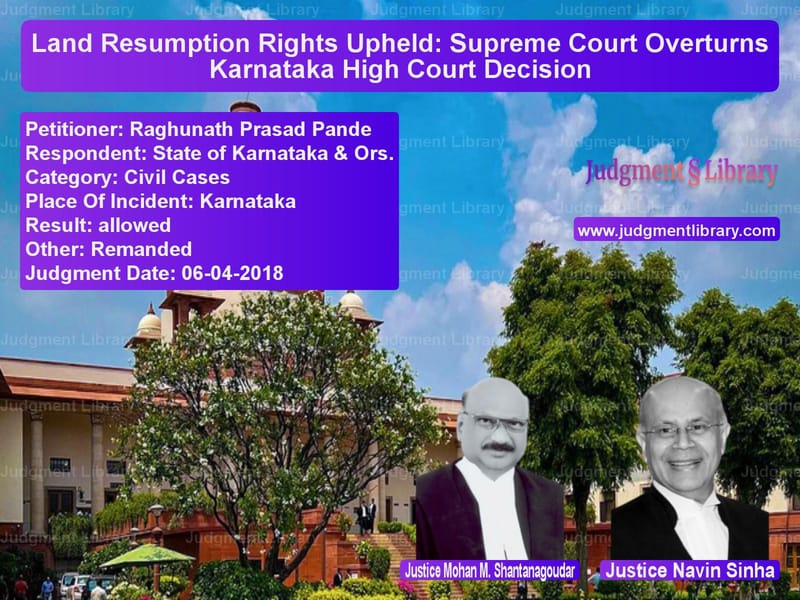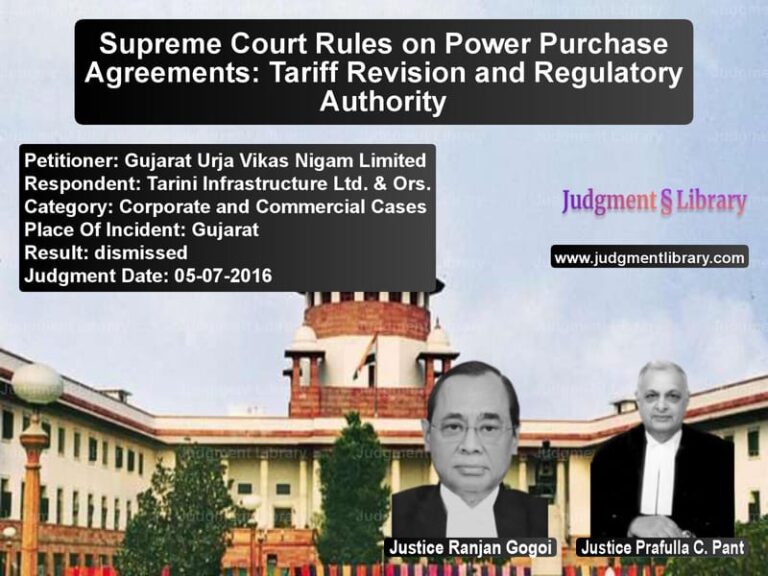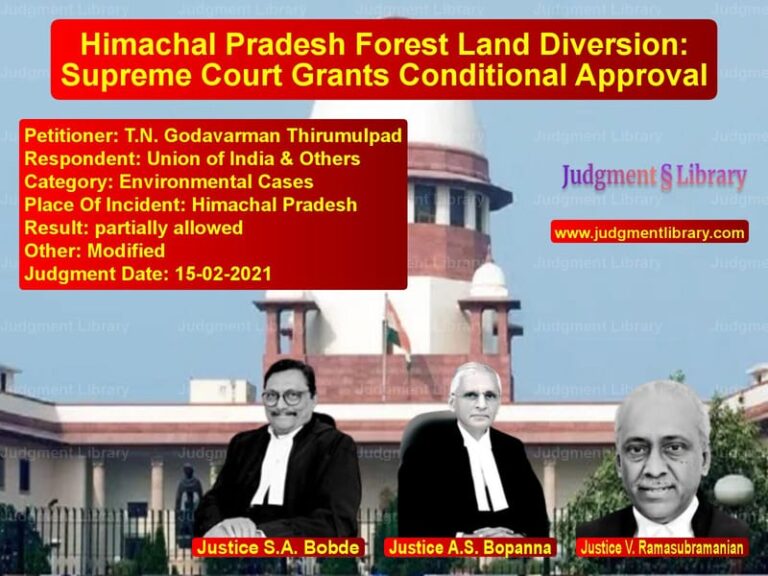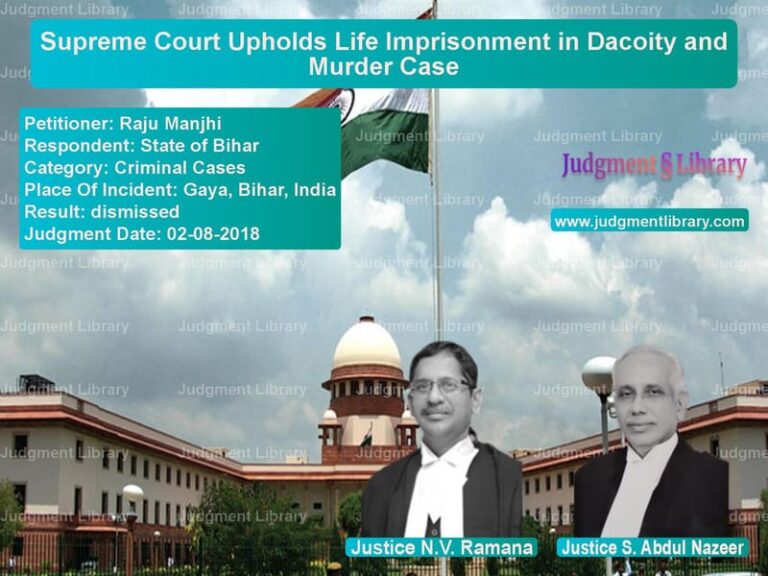Land Resumption Rights Upheld: Supreme Court Overturns Karnataka High Court Decision
Land disputes involving resumption rights and tenancy laws are complex, particularly when historic land reform laws are in play. The case of Raghunath Prasad Pande vs. State of Karnataka & Ors. revolved around the resumption of land by a landlord under the Mysore Land Reforms Act, 1961 (now Karnataka Land Reforms Act, 1961). The Supreme Court, in its judgment dated April 6, 2018, overturned the Karnataka High Court’s decision and ruled in favor of the appellant.
This ruling is significant because it reaffirms the validity of compromise agreements in land resumption cases and clarifies procedural aspects of possession under the Karnataka Land Reforms Act.
Background of the Case
The dispute concerned agricultural land in Karnataka, where the appellant, Raghunath Prasad Pande, had entered into a compromise agreement with the tenants for the resumption of 4 acres of land. Under the Mysore Land Reforms Act, 1961, a landlord could resume land for personal cultivation by following a prescribed procedure before the Land Tribunal.
The appellant filed a resumption application under Section 14 of the Act, which was resolved through a compromise agreement recorded by the Munsiff/Tribunal, Dharwad, on March 2, 1970. The tenants agreed to surrender 4 acres of land, and the appellant took possession.
Legal Proceedings
High Court Decision: The Single Judge and Division Bench of the Karnataka High Court ruled against the appellant, stating that the formal procedure under Section 14(5) was not followed, making the resumption invalid. The High Court held that:
- The appellant did not formally apply for possession after obtaining the Tribunal’s certificate.
- The resumption process was incomplete, and therefore, the land continued to be vested with the tenants.
The appellant then approached the Supreme Court.
Key Legal Issues
The Supreme Court examined the following issues:
- Whether the compromise agreement recorded by the Tribunal satisfied the procedural requirements of Section 14(5) of the Act.
- Whether possession of land was legally transferred to the appellant.
- Whether the Karnataka High Court erred in rejecting the resumption claim on procedural grounds.
Arguments by Both Parties
Petitioner’s Argument (Raghunath Prasad Pande):
- The compromise agreement was recorded before the Tribunal and legally binding.
- The tenants voluntarily surrendered possession, which was confirmed in multiple legal documents.
- The High Court’s decision was hyper-technical and ignored the factual reality of possession.
Respondent’s Argument (State of Karnataka & Others):
- The appellant failed to follow the strict procedure of Section 14(5), which required a separate possession application.
- The compromise agreement did not substitute statutory requirements.
- The Tribunal’s order did not explicitly grant possession.
Supreme Court’s Observations
The Supreme Court, comprising Justices Mohan M. Shantanagoudar and Navin Sinha, ruled in favor of the appellant, holding that possession was legally transferred through the compromise agreement.
Key Excerpt from the Supreme Court Judgment:
“Since the composite compromise is acted upon by handing over the possession of 4 acres of land in favor of the petitioner by virtue of the order dated 02.03.1970 passed by the Munsiff/Tribunal, Dharwad, and as handing over of possession is undisputed, it can be concluded that the petitioner was in possession of the property legally.”
The Court further held:
“The view of the High Court, in our opinion, is hyper-technical and too sophisticated under the facts of the case.”
Final Verdict
The Supreme Court ruled:
- The Karnataka High Court’s decision was set aside.
- The compromise agreement was legally valid and enforceable.
- The appellant’s possession of the 4 acres of land was recognized.
- The appeal was allowed, and all pending applications were disposed of.
Impact of the Judgment
This ruling has significant implications for land resumption cases in Karnataka:
- It clarifies that compromise agreements recorded by the Tribunal hold legal validity.
- It prevents technicalities from overriding substantial justice.
- It strengthens the rights of landlords who have legally resumed land.
- It ensures that procedural lapses do not unjustly deprive rightful owners of possession.
Conclusion
This judgment reinforces the importance of compromise agreements in land resumption cases. The Supreme Court has ensured that substantive justice prevails over procedural technicalities, securing the appellant’s rightful claim to the land.
Petitioner Name: Raghunath Prasad Pande.Respondent Name: State of Karnataka & Ors..Judgment By: Justice Mohan M. Shantanagoudar, Justice Navin Sinha.Place Of Incident: Karnataka.Judgment Date: 06-04-2018.
Don’t miss out on the full details! Download the complete judgment in PDF format below and gain valuable insights instantly!
Download Judgment: Raghunath Prasad Pan vs State of Karnataka & Supreme Court of India Judgment Dated 06-04-2018.pdf
Direct Downlaod Judgment: Direct downlaod this Judgment
See all petitions in Property Disputes
See all petitions in Succession and Wills
See all petitions in Landlord-Tenant Disputes
See all petitions in Judgment by Mohan M. Shantanagoudar
See all petitions in Judgment by Navin Sinha
See all petitions in allowed
See all petitions in Remanded
See all petitions in supreme court of India judgments April 2018
See all petitions in 2018 judgments
See all posts in Civil Cases Category
See all allowed petitions in Civil Cases Category
See all Dismissed petitions in Civil Cases Category
See all partially allowed petitions in Civil Cases Category







